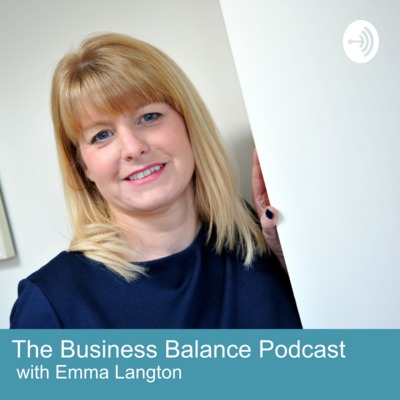
The Business Balance Podcast
By Emma Langton
You can find me at www.emmalangton.com/

The Business Balance PodcastJul 16, 2018
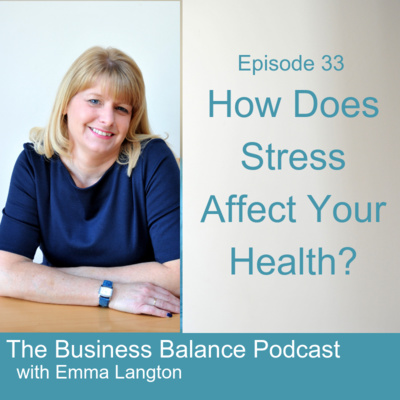
BBP33 How Does Stress Affect Your Health?
How Does Stress Affect Your Health?
Stress comes in all shapes and sizes. Stress can be defined as any type of change that causes physical, emotional or psychological strain. The term ‘stress’ refers to the response you have when facing circumstances that force you to act, change, or adjust in some way to maintain your footing, or to keep things balanced. In small doses, these factors increase your strength and stamina, speed your reaction time, and enhance your focus. This is where some people will say stress is good for you! So, does stress affect your health?
Stress is a huge contributor to people needing time off work. Surveys suggest that over 10 million people in the UK are taking time off due to stress and stress related illness. Mental health issues, including stress and anxiety are the reason for one in five visits to a GP.
What’s Going On?
When you are stressed your adrenal glands are forced to produce more cortisol and adrenaline (the main stress hormones). These hormones prepare the body for emergency action.
· Heart pounding or beating faster,
· Breathing quickens or become more shallow
· Muscles tighten,
· Arms or legs shake
· Blood pressure rises
· Your senses become sharper
All of these are automatic reactions coming from an area of the brain called the amygdala. That’s like your internal fire alarm. This stress response has existed in humans since we were cavemen. Life was much simpler then and life and death situations really meant life and death! Now, they don’t. However, your brain has not figured that out!
Here’s the thing. When your internal fire alarm is going off, it also switches off your thinking brain. So you can’t think clearly or logically!!!
Is it Affecting Your Health?
Stress that continues over long periods of time can contribute to serious health problems. Stress can affect you in many ways.
· Weakened Immune System and catching colds more easily
· Sleep Issues
· Low Energy, feeling tired all the time
· Feeling Overwhelmed
· Memory Problems / Poor Time Management
· Anger Issues
· Being Negative
· Aches and pains for seemingly no particular reason – tight shoulders, clenched jaw, stiff back
· Spots! Cortisol clogs your pores
· Thinning hair
Often we only notice the emotional effects of stress, however there are many physical impacts too. So it’s important we do something about our responses or even our lifestyles to counter-balance this.
Causes of Stress
The hormone responses are there for times when you are being chased by a tiger or a bear, not for any of these listed blow! There are many events in life that can cause stress.
· Wrong or Difficult Job
· Redundancy or Unemployment Worries
· Long Hours
· Conflict with Colleagues
· School or College Pressure
· Friendship Difficulties
· Test Anxieties
· Financial Worries
· Negative Relationships
· Loneliness
· Parenting Challenges
· Unhealthy habits
The people that I see regularly, come to me for coaching and other help because they still don’t want to go to their GP AND they don’t want to take time off or alert their employer that they are feeling under pressure. If you think stress is wrecking your body, then make it a point to get things under control. Remove yourself from toxic situations and plan some stress-reducing activities.
Get in touch to talk about how I can help you and your workforce to get stress under control.

BBP32 Being Equipped for Difficult Situations with Nicola Richardson
How do we equip ourselves and the people around us to deal with difficult situations?
In this final episode of the Resilience month on the podcast I talk to Nicola Richardson who is a Business and People Mentor. She works with businesses to get the best out of people, process and performance.
There’s quite a lot of good chat and sharing of information in the podcast but also a couple of key things I talk on the podcast this week that I think are important messages.
Nicola tells us what happened to her when she tried to power through and keep going after a significant life event. She shares the detrimental effect it had on her health and also why that made her change things in her life completely.
We also talk about the healing power of crying! Often other people struggle to see others crying. Often too, as children we have been told “don’t cry” and so we learn to stem the flow and hold back the tears.
Nicola is running a workshop called Thriving not Surviving which will be helping people understand and identify what helps them and what is difficult for them.
Nicola shares what hobby she has that helps her to zone our from the busy day. She also says she still uses a great tip that I gave her regarding social media, where I advised switching off all notification so there are no distractions and that has helped her a lot too to filter information and not feel overloaded.
We also talk about the need to a good level of emotional intelligence and self awareness is needed. It’s really helpful for us to build our resilience and when we are aware of our feelings and emotions, then we can do something about them, in an appropriate way rather than stuffing them down, ignoring them or having them overflow in tears or anger at times when we really don’t want to have them on show.
You can get in touch with Nicola via her website at https://thepeoplementor.co.uk/ if you're interested in the in-person or online workshops that she provides. The first one is on 26th April 2019 in Lincolnshire.
Have a listen and if this is useful, share with someone you think might help.
If you want more information on working with me or you have a question for me, then get in touch on my website.
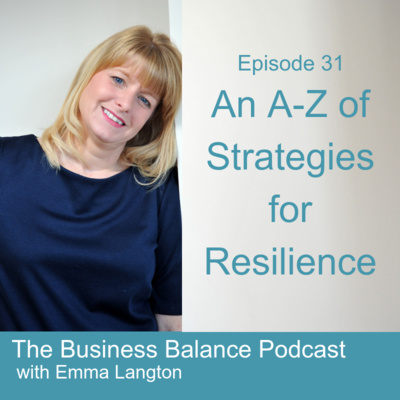
BBP31 An A to Z of Strategies for Resilience
Resilience needs areas to be strong and calm. This provides the foundations for you to live a balanced life.
When your mind and body are resilient, strong and stable, you will be strong and stable too. It forms the foundations of a powerful basis for everything you do in life. Life is full of challenges and we cannot possibly avoid everything. Resilience is about that ability to deal with the rough and the smooth and be able to swerve the curve balls and get back on track.
When life knocks you down, you need that bounce-back-ability to be able to get up again. That’s why we need to ensure we have lots of tools and resources in our lifestyle generally. So if one area is weak, under pressure or overloaded then things begin to fall apart.
You need all areas of you to be equally strong. So think about where you have gaps or think about what situations mean that you have wobbles.
Fitting things into your everyday life is the best way. You can’t always take a holiday or book a spa day – and anyway, if you’re living or working in a place of pressure you won’t have the time. You’ve probably got some other things you’d like to spend your money too!
Relying on things like spa days, holidays or even going to gym (whilst it’s great to do, you need space and time for this). Getting the balance to boost your resilience needs to be little everyday things that you can.
So I talk about a (kind of) A-Z to give you ideas.
There’ll be a whole load more. I’d love to know what you do so drop me an email or get in touch from my website. If you’ve really no idea what to do, or what will help, then also get in touch, lets book a call and we can talk about how my coaching can help you know exactly what works for you, how to manage your resilience, so you can be confident in dealing with life’s challenges.

BBP30 Managing Your Resilience
Good resilience is your ability to kind of cope and to rise to those challenges.
2:13
Resilience relies on different skills and resources. Some might be about your physical health, mental health or relationships, thinking skills.
So, if you're a manager or leader, or you're setting an example somewhere, then that's important to manage your resilience.
When we recognise and understand our own emotions, we can do the same with others. That also means we can impact ourselves and others positively and negatively.
It's not good floating around like a swan and pretending everything is fine. If you spend time trying to look calm and glide gracefully whilst feeling like you are paddling madly underneath. Outwardly you are managing to look composed, keep up with that endless pressure but inside you’re absolutely shattered, overwhelmed and feeling a bit ill or like you’re not coping.
Recognise the Feelings
6.40m Firstly, you need to recognise your feelings and allow yourself to feel them (instead of ignoring them or distracting yourself). If things are rough you might need to set aside time to do this.
7.25m Listen in when I talk about how I allowed myself to really feel the big feelings.
Let Go
8.30m You might need to have a good cry! I explain about the healing aspects of crying and why it's good for you.
10.0m Another good way to release and let go is to visualise letting go of the feelings. Imagine you are gathering up all the thoughts and feelings related to the negativity and in your mind picture some way of getting rid of them. I explain some options on the podcast.
Revitalise
12.30m Look at what you can do to revitalise yourself. It might be spending time with your partner, your kids, your friends, making connections with other people. We need conversations and interactions we need to laugh. We need to find joy somewhere, even if it feels like it's pretty tricky to do. Think about what will boost your feel good chemicals to fill up that emotional bucket.
Leave Things
Seriously, look at what you can leave for a while. Re-prioritise and give yourself some time and space. It doesn't have to be for ever!
Time Out
15.0m I run a bath, some people do Netflix, some people run, exercise. They all create a space in your mind and body. This allows the negative stuff to drain away, out of your bucket. Leaving space for good stuff.
Sleep
Prioritise the important needs. Instead of staying up late trying to get everything done. Get your sleep. We all find it hard to function when we are tired. Never sacrifice your sleep.
Filter
When you're overloaded or feeling pressure the last thing you need is everyone else's stuff! Filter it out. Shut down social media. Remember too that people only talk about really good or really bad things. They’re not going to show or talk about the fact that they are not coping, so filter information and keep reality in mind. Don't let people drain you with their woes.
Also filter things that annoy or drain you. I share a good example of mine in the podcast.
Think about the kind of good stuff that is going to fill your emotional bucket of resilience with good stuff.
Next week, I’m going to talking about whole list of things, so remember to come back to get more ideas in case you need them.
If this is really useful to you please share it with your friends, and please do go over to iTunes and leave a review I'd really love it if you did that. You can contact me www.emmalangton.com/contact for help with your resilience.

BBP29 Finding Emotional Resilience
Resilience is a theme for this month and today we are looking at what Emotional Resilience is.
In my newsletter I share some information about me that will explain why I've chosen to focus on resilience. You can sign up HERE.
I want to share with you what I've done to keep going when challenges come our way or we have tough times. How do we keep going and be resilient?
What is Emotional Resilience?
It's about our ability to deal with situations in life, how easily we can bounce back. Clients come to me when they've "had it up to here" or "can't take any more". That means your emotional levels are full up. I talk about an emotional bucket and how stress, anxiety, pressure can build up. They can come from self-doubt, shame, embarrassment too. It might be about the way we are treated or how we talk to ourselves.
It can affect our ability to cope. I explain how this can affect me personally on the podcast.
This bucket of negativity can sometimes fill up quickly or take quite a while. The speed at which your bucket fills up, is not the issue, my concern is how full it is, and what we can do about it.
We need to be able to balance our emotions with both positive and negative feelings and circumstances.
How Do We Know if Our Emotional Bucket is Full?It's much more than overwhelm. When your bucket is full, we feel it all the time. Or, it can take a tiny thing to tip us over the edge. Anger bursts out. Tears overflow. If you often feel worried or nervous, frustrated, sad, irritable, angry, scared, upset, overwhelmed, inadequate or even wanting to escape, then it’s likely that your emotional bucket is overflowing.
What's a Good Balance?
If your bucket is too empty, then that’s not going to be great either. If this is the case then you might feel low, fed up, tired all the time, bored, negative, nervous, anxious or even depressed. An empty bucket can also drain those around you too.
(sorry for all the doom and gloom - things can get better - honest!!)
We need our buckets to be somewhere in the middle, just right. That way we can be happier, more comfortable about ourselves, staff, colleagues, clients. We can think more clearly, make better decisions and generally enjoy life more.
What Helps to Maintain Emotional Resilience?
We need to make sure we've got enough good things going on in our lives to be able have the balance. To have positive times and situations, opportunities that are fun and good for us. Also to have tools in our toolkit that we can use to reset the balance of those emotions.
11.0m I talk about one particular thing that really makes me smile!
Spend some time over the course of a week, noticing what lifts you up, brightens your day. What small things are in your life that help you feel good. What drags you down and adds to negativity? Notice those.
Then come back over the next few weeks and listen to future episodes where I dive deeper and give more information on resilience and tools you can use to develop your emotional resilience.
If you want to talk about working with me to help this, then book a call or look at how to work with me.
If you'd like some live coaching or to ask a question that you'd like to be mentioned on the blog or podcast, drop me a question HERE.
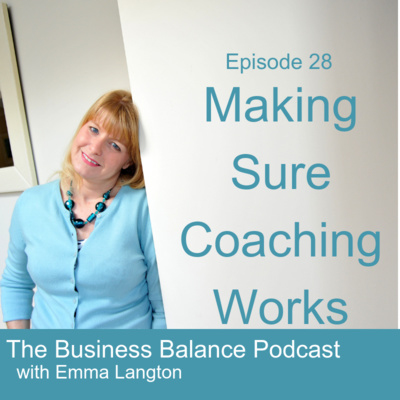
BBP28 Making Sure Coaching Works
What if coaching doesn’t work?
It’s important for my clients to know that the coaching process works. But sometimes, coaching doesn’t work! What can you do to make sure coaching works ?
I’ve had some great coaching and I’ve one that was awful. Here's what you can do to ensure coaching works for you.
1. The Wrong Type Of Coach
You need to consider WHAT you want the coaching for. WHY you think you need it and WHERE you want it take you. This will narrow things down for you.
Then investigate different coaches and how they work. Some teach you their model. Others look at you, your business, your struggles, your goals and help you figure out what will work for you (that’s me)!
If someone recommends a coach to you, make sure it’s going to meets your needs.
2. No Rapport Between Client And Coach
The client/coach relationship is crucial. Some clients thrive on a gentle, nurturing approach, whereas others prefer direct straight talking. Then there’s a balance of all sorts in between (I’d say I’m honest and straightforward with support and kindness thrown in).
In order to ensure there is rapport and the possibility of a good working relationship, it’s always a good idea to meet or talk with your executive coach before you jump in.
3. A Lack Of Trust
You’ve got to be able to trust your coach. You’re going to be talking about your feelings and your struggles. Whilst it won’t all be focussing on the negatives, you’ll get the best from coaching when you’re honest and possibly a bit vulnerable, so you need to feel safe doing that and trust that your coach can help you.
If you’re part of a coaching programme through your organisation, make sure you know the terms: by checking the confidentiality terms you can feel safe to disclose all your thoughts, issues and feelings.
I usually work independently with executives and entrepreneurs, and we do sign a working agreement which sets out confidentiality clearly and professionally.
4. Boundaries And Expectations Are Not Clear
Clear boundaries are important. Ensure your coach will set out what they expect, when and how to contact them, and ensure they’ll do what they say they’ll do. Clear boundaries help you to feel safe so that you know what’s OK and what’s not in the coaching relationship.
I always plan out all sessions in the diary. There is flexibility to change them, but there’s a cancellation policy too.
Also get clear on your goals. It’s hard to make changes if you don’t know what you want to change, or what that outcome will look like.
5. Coaching Gets Stuck In The Past
Coaching is about moving you forward to where you want to be, not dwelling on what you ‘should’ have done. That comes through looking to the future and action.
Sometimes we need to go back and work on getting you some strong foundations so you can go forward stronger and stay successful in that progress.
6. When There’s No Legacy To The Coaching Work
Whether you’re with a coach for an hour, a day or three months, it’s really important that you can maintain the good progress you’ve made. There’s no point investing in coaching then letting old habits and patterns slip back in. So it’s worth spending time working with your coach to identify how to apply the changes to your life for good.
With my experience in psychology and neuroscience I help you make changes easily without having extra duties on their to-do list! That makes sure that coaching does work.
Contact me HERE or BOOK in my diary and lets talk.

BBP27 Your Most Valuable Asset
What’s your most valuable asset?
This might be a question that raises lots of answers and you might be totally against what I’m saying. If so, that’s fine. We’re all entitled to our opinions, but here’s mine.
Aside from your customers - because let’s face it - if you don’t have customers, you don’t have a business or a job. After that, what is your most valuable asset?
Your business? Your home? Your intellectual property? Your network?
All of those are valuable, but (bonus points to you if you saw this one coming!) YOU are your most valuable asset.
It doesn’t matter whether you’re a leader in your own business or someone else’s, what makes you stand out is you.
And it’s not really about your knowledge and expertise either. Of course those things are important, but knowledge can be learned. What’s harder to cultivate is a healthy mindset. A healthy attitude to yourself, your life and your work.
Mindset might sound fluffy. As though it’s about patting yourself on the back and thinking happy thoughts so you have a positive day. But it’s so much more than that.
Your mindset is at the root of every decision you make. Whether you’re operating from a place of fear or growth is critical. With a closed or a fearful mindset you are more likely to:
- Miss seeing opportunities
- Hold yourself back
- Take on too much, rather than delegate
- Let other people set the agenda
- Delay decision making (or the opposite – be trigger happy!)
- Feel overwhelmed or stressed.
You do still need to put effort in but when you have a strong belief in yourself then it can make all the difference!
Can changing something internally really change how you experience life in the real world? Can it help you feel better as well as be more productive in life and business?
Yes, it can. But it’s not as easy as slapping a smile on your face and saying a positive affirmation each morning.
Real mindset change involves digging inside to understand where your thoughts and beliefs come from. It’s about bringing to light the buried stories we tell ourselves about why life is hard, or why we’re not equipped to deal with it, or why we can’t get that promotion. And it’s then about rewriting the script so we’re working with ourselves, not against.
The latest neuroscience has shown that our brains are constantly re-wiring. Even through adulthood.
I’m not saying that this process of re-wiring is easy … but it can be done. The first step is recognising that you need to re-train.
Sometimes you might need help to recognise what’s going on with you and what can be done. When we are deep in the middle of something, we can’t see how the land lies. We can’t see ourselves fully without someone else holding up a mirror and inviting us to look.
That’s where a coach will help you understand what’s really going on in your head, get clear about what you want, and your way forward. Coaching helps you to unlock the potential that’s already inside you.
So – given that you’re your own greatest asset, when’s the last time you invested in yourself? And did you feel the benefit? I’d love to know!
And if the time is right for you to embark on executive coaching, get in touch and we can explore the right option for you.
See more detail about how to work with me here.
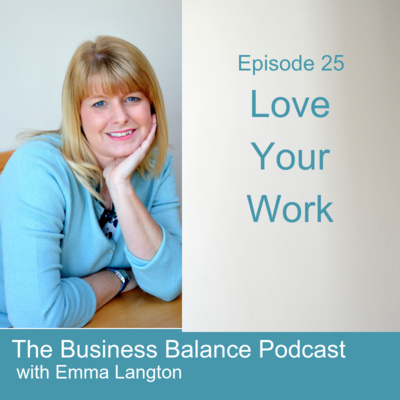
BBP26 Love Your Work
For Valentines day, to share a bit of what I LOVE to do, I’ve got a very special offer for you.
I've set aside 10 spaces for a 1 hour, 1:1 intensive with me. I normally only run intensives for at least 2 hours and they’re investment of £329. But because it's my birthday, I'm offering a 1 HOUR SESSION FOR ONLY £125!
You can book your session here - when 10 are gone, they’re gone. Any questions get in touch.
This week on the podcast I'm talking about ways you can love your work more.
Let’s face it we spend a bit part of our lives at work and it's always so much easier when we love what we do.
There can be many reasons why we might not love what we do. We might have fallen out of love with it for a variety of reasons. Here's what we can do:
1. Plan and Schedule
When you schedule your day or week you feel like you’re in control. You can see where you have gaps, or busy times and make adjustments.
Instead of having a massive to-do list creating overwhelm, stress or nagging feelings, your brain can rest easy knowing that time is allocated to do that job.
Each day do the biggest or most important things first. That way you use all your fresh brain power when you need it most.
2. Stop Multitasking
Concentrate on one thing and do it well. When we switch from one thing to another, or get distracted with notifications and emails, the reality we’re just doing really fast switching. It’s not the most efficient way to work and we end up tired and fed up and feeling unproductive - or that we’re working harder to get less done. That’s just demoralising!
3. Boundaries
You might need to change your mindset or perspective about boundaries in order to say goodbye to your desk, laptop or email. Then you can be actively engaged in your social and leisure time. You might be saying that you can’t afford to do this. Well, apparently more people than ever would consider a salary cut in order to improve their quality of life. Take action to get that better balance.
4. Be Sociable
When we spend all our time working, we have less positive interactions and less pleasant experiences. That means less positive feel-good chemicals.
Oxytocin - often called the love hormone, is released when we interact with touch, hugs and love. When oxytocin is released, it reduces stress, anxiety, promotes connection and feelings of trust, which all aid relaxation!
So you might feel too tired to be social or interact with friends or loved ones, but science says it’s good for you!
5. Get Feedback
Take step back and seeing yourself through the eyes of someone else. Or gather information about what people value from you, and what they don’t. That might be opening up to some feedback you might not want to receive, so you need to be brave here. However you might be surprised at the feedback you receive. And a bit of customer love is always helpful to boost your morale.
6. Change Your Self Talk
See more about speaking to yourself the way you would a friend.
7. List Your Accomplishments
Make a love book. Gather things that show you're good at what you do. Start with certificates, then feedback, photos, letters of achievement, the congrats letters etc.
Feeling good about yourself helps you to love yourself and your work more.

BBP25 The Stories We Tell Ourselves
Often there are different stories we tell ourselves that can keep us stuck and stop us moving forward or make things difficult for us.
When we tell ourselves stories it can be to rationalise or justify why we've done things we done (or not done). We might used past experiences and learning but there's nearly always an emotional response to that story.
- "I'm not cut out for leadership"
- "It wasn't meant to be"
- "I don't have time"
Listen in at 3.0m about the story I was telling myself about how my business was a success. In a way it was, but the reality was I could have done so much better and worked smarter.
6.27m Often we do a comparison with other people and tell ourselves stories about how we're just not enough in some way. Outward appearance isn't everything, but we can tell ourselves the stories abut why we're not matching up to others around us.
The biggest thing behind this is our mindset. The very first thing we need to do is learn what is going with our mindset. We need to talk to ourselves as we would a friend, or even a small child, to be kind to ourselves, to change the language we use.
If you don't support you, who will? Sometimes we need that support externally too.
The fastest way to change our mindset, is to recognise the stories we tell ourselves.
When you firmly believe in yourself and recognise what are stories and excuses you can increase your changes of success. When you value yourself you add value to all areas of your life in general.
10.0m Sometimes we grow up with a belief that no-one is there for help or support. We grow up with a belief that we need to be self sufficient and cannot ask for help. We must listen to those stories so that we can begin to change them.
Our stories give us a sense of who we are. So if we are continually telling ourself we are "no good" about something, then it will hold you back.
Sometimes we need to learn something different, or even let go of old stories that we've been telling ourselves.
Think about some of those stories and see what you can do to begin to change that. When you listen to the stories, you're half way there to identifying what you need to do to change.
12.55m Listen in about the funny but different ways we can view situations in our life through the ages. Sometimes those stories change over time, if that's the case, make sure the stories are beneficial and factual for you.
But sometimes they do not serve us well. So when you dive deep underneath the cause or reason, you can make those changes in your mindset and be really honest with yourself.
Make those changes. Re-write your story.
Let me know if you've been telling yourself stories. Are they keeping you small or restricting you?
You can alway get in touch me with or book a call so that I can help you identify what your stories area.
One of the reviews I got recently said I had ninja questioning skills!
Sign up to my newsletter and get all my hints and tips straight to your inbox.
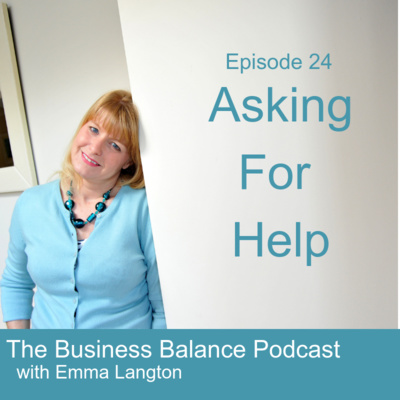
BBP24 Why Asking for Help is not Weak
We can’t be strong all the time. We used to live in tribes remember! Those tribes and other people were there to support, help and guide us.
The modern world is about being strong, being able to do all things and not showing a “weakness”. There’s a lot of British phrases that pre-programme us to ensure that we don’t share that we need help.
"Stiff upper lip"
"Keep your chin up"
This create a deep learning and mindset that asking for help is a sign of weakness. This learned belief is created at a young age. It might be that we’ve been told to “speak when we’re spoken to” or “be a good boy” so we learn not to ask for what we need and not to cause any bother.
The key is to be able to change our minds about asking for help.
There are so many people who have come to me asking for help.
Listen in to hear about 3 examples and what I did to help.
The Chief Exec who was putting a ton of extra time just to feel successful, even though there was lots of external evidence to show he was doing well. He said to me “it’s a sign of weakness isn’t it” We worked on his belief and mindset so that he could delegate with ease, manage the expectations of himself and his team and still be able to spend time with his family and enjoy it.
The top city Lawyer who was embarrassed because she was getting emotional at work and felt like it looked like she couldn’t cope. She was worried what people would think. I helped her with ways to deal with the overload, educated her on being able to identify when her stress levels were high so she could use tools that work for her and get that balance in her life, without compromising her professional approach.
The business owner who thought being stressed all the time was normal and that if he was in control of everything it would help. Truth was that when we reduced his stressed levels, identified the areas that really caused him the stress he felt so much better and even made some changes in his business direction to support this new way of looking at things.
Even me. Listen in when I explain what I've to ask for help.
All of us need help at some point or other. Knowing when to ask for help is the first step. Reaching out the right kind of people who will be there for you and who get it is important too.
Think about someone who has asked you for help. What did you think of them? I’m guessing your first response wasn’t “oh they’re weak” or “ooh they can’t cope”.
That’s probably one of the main reasons we don’t ask for help. We worry about judgement. We’re frightened about what people will think.
Fear is a big thing that stops us moving forward. Stops us being able to perform at our best.
When we get past that, or reach out for help, then we are taking that first step to the next level.
If you're ready to ask for help then we can book a call and discuss your situation.

BBP23 Banishing January Blues
I'm talking today about January Blues.
The 3rd Monday in January is known as Blue Monday. Apparently this is because this is the time that credit card bills have come in, we realise how much we’ve spent on Christmas. The weather is cold and wet and dark and then it’s not just the day that is doom and gloom, it’s often our mood too.
So how you can get through the blue and gloomy days.
Have something to Look Forward To.
It’s often a time when people look at booking holidays or even moving house! Creating a feeling of anticipation with what we are looking forward to means we feel excited and then naturally release endorphins, the feel good chemical.
Be More Active.
I know the gyms are full of New Year resolution people but you don’t have to do that. Exercise definitely boosts your mood so even just getting out for a walk at lunchtime when there’s more daylight can be helpful. Again it releases the feel good chemicals.
Meet Friends.
Although we might feel like we want to stay in and hibernate we need social interaction. We are meant to be around people. You don’t necessarily need a big party or group, but meeting friends, talking and laughing is a create mood enhancer.
Look After Yourself - inside and out.
You’ve probably just spend around a month eating rubbish, cheese and chocolate – I know I have! Reality is that those kinds of diets leave us feeling sluggish and that doesn’t help our mood either. Some say that the gut is important as the brain on our mood. So get yourself back to nourishing yourself from the inside and cut out the chocolate, sugars and rubbish. It doesn’t have to be salad (it’s far too cold for that) it doesn’t have to be restrictive either (otherwise you’ll just crave it) but it can still be food that is good for you.
Look for Positives
I’m beginning to notice a little bit of lightness in the day. My daughter comes home from school around 4pm most days and I’m beginning to see a bit of brightness at that time. I can already how the days are getting longer. Even if it’s just a little. It all helps to give a bit of positivity.
If you’ve listened for a while, you’ll know that I’m big on looking at things that raise your positivity. Find small things in your day that you can be pleased about. They don’t have to be super fantastic, just little things that brighten or give you something to be thankful for. Write them down on a regular basis too so that you can see the positivity increasing, even if feels like a rubbish day, there’s evidence to remind you that it’s not all bad.
Smile
When I walk Charlie, even if it’s cold and wet and I’m there with my hat and gloves and wet gear, I still make eye contact, smile at people and say hello. It’s surprising how one smile can go a long way to make both you and the other person feel better.
If you're still struggling to feel positive then get in touch and book a call then we can talk about how I can help you.
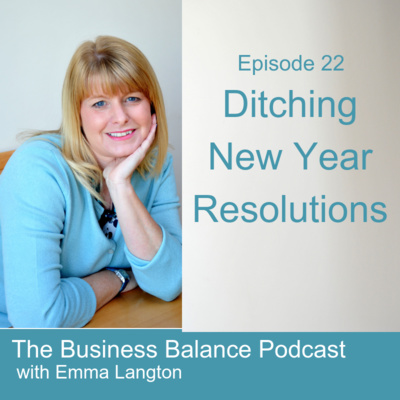
BBP22 Ditching New Year Resolutions
I'm talking about why I don't make resolutions. As a person who is all about self-improvement, it might sound a bit strange to hear me saying that. Check out the last episode on setting goals!
In 2019 January 17th is Ditch New Year Resolutions Day!
ExpectationsOften we think about what we WANT to do, based on what we feel we SHOULD do. It’s what everyone else does so maybe we should too? Well, that really depends on your set of expectations. If you are doing something because you feel you should then it’s going to forced, it’s not going to be comfortable. It might be achievable but it’s probably going to be quite difficult. If you think about what you feel you should and then repeat that sentence with the word could and see how it sounds. Do you still really want to do it? Maybe you will, maybe you won’t. It will change your perspective and change your expectation of whatever you previously thought you should do!
TimingJanuary (in the UK anyway) is traditionally a time for hibernation, keeping warm and getting through the cold, dark days. We’ve now gone past the shortest day and just because days are getting slightly longer it doesn’t mean that we need to go out there and be some bright bouncing invigorated way.
It’s not really quite the right time for making big changes, it’s not a natural time of growth in nature and so it’s not a natural time for growth in ourselves either. There are plenty of other times in the year – when there are less expectations and less pressure – for you to set yourself some goals, make changes, build dreams, set resolutions. They don’t just have to be done in January.
ConsistencyIf we want to be consistently growing, changing, adapting then we need to be doing this little and often. So instead of beating yourself up to “Stop this”, “Be that”, “Do More of the other” – just because it’s a New Year Resolution, try making small adjustments to your life, your plans, your goals and you’ll soon begin to notice just how achievable they are. Whatever it is that you are setting yourself as that resolution can be a small and consistent thing that becomes second nature.
Success RateApparently about a third of New Year Resolutions don’t make it to the end of January! Only about 10% of resolutions last the distance. So I’m not saying that you don’t make any New Year Resolutions, just think about your timing. Maybe there are better times for you do make changes – at the new tax year, new school year, at your new year of each birthday? Do what you want and need to do, when you feel you are ready and that way your changes and improvements are quite likely to be more consistent and you can then bask in the success!
So if I want to make goals, changes or set targets I don’t wait until January to do it. I make changes whenever I need to. My life, my work, my business is constantly in review. Not in a big way, but gently noticing. I regularly take time to look back every now then, each month, each quarter (and each half term with my daughter) and I celebrate the success and continue along or I make adjustments to ensure my goals and targets meet the needs.
If you're ready to make simple changes with big results and want to talk about how I can help you do that, BOOK A CALL. Lets get clear clear on whats causing your problem and start your journey to success - in the BEST way for you!
http://www.emmalangton.com/contact/
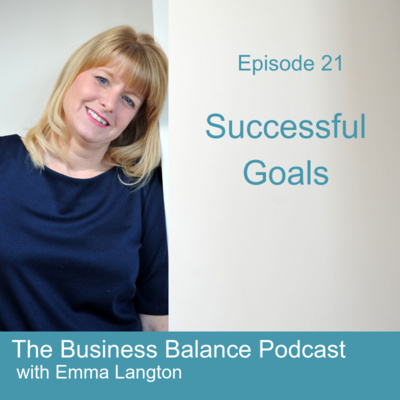
BBP21 Successful Goals
If you want help with your goals and mindset, get in touch. Find me at www.emmalangton.com or email from the contact page to get in touch. Here's my 8 steps:
1. Get Clear on Your Goals
Ensure you know what it is that you really want to achieve when you set a goal or new resolution. What do you want to get out of it? When you achieve this goal what will it look like, feel like? How will you know if you’ve got there?
Be really specific.
These are a couple of goal setting models you can use:
SMART
Specific, Measurable, Achievable, Relative, Timely
GROW
Goal, Reality, Options, Way Forward
2. Write it Down
Writing down your goals and plans makes them more real than keeping them in your head! Break it down in steps and stages or achievable chunks. If you want to go to the gym more or do more exercise, plan it into your week, plan the when, where, how.
3. Be Accountable
Tell people what you are going to do. This also mean you take responsibility for what goes on. Being accountable means that you’re highlighting what you are going to do, and it’s really down to you to make it happen (regardless of what happens around you). It’s a great way to keep yourself in check.
4. Take Action
Please don’t sit back and wait for things to happen! You cannot hope that everything will fall into place. So those specific things you said you were going to do, you actually have to do them (even if you feel uncomfortable or it starts out being difficult!)
5. Review
Review your plans periodically. That might be every week or month. If some of your plans didn't work, that’s OK. It doesn’t have to mean it’s all over! Review, tweak, change, adjust to make sure your plans continue to work for you.
6. Visualise (9.20m)
Visualise how you want your goal to be. How do you want to look and feel? Check out this previous podcast on visualisation.
If you’re on work successes, what do you want that success look like? Where do you want to be sitting, what do you want to be doing, which people do you want to talk to, what do you want to be talking about and who do you want to be working with?
Really think about the details.
How will you talk? Think of your body language.
Thank about the images like your diary / bank balance / desk space. It all helps add depth and detail.
7. Affirm Your Mindset
Mindset is so important. Some people say mindset accounts for about 85% of successes! So do work on your mindset too. Create a phrase or two about how you want to think, how you want to be, what it is that you are going have or do. Ensure you use present tense for these phrases and affirmations like “I can do this". "I am confident".
8. Repeat Each Day
Each day, get this into your routine. Visualise your goals and take action, check, adjust then repeat.
Little and often stops the overwhelm and negativity.
Let me know how you get on!
Get your free overwhelmemmalangton.activehosted.com/f/5
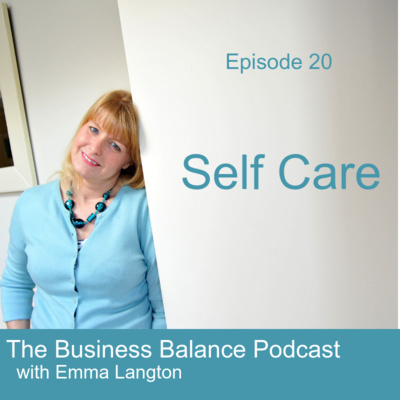
BBP20 Self Care
Self care is a necessary function that we all need in our lives. In this fast paced world we seem to forget to put ourselves first.
“You cannot pour from an empty cup”
You need to fill up yourself first. Self care is about actions and things you do in your life that help to protect, maintain, develop or improve your health, wellbeing, your emotional and physical states. In other words, we need to look after ourselves.
Often we think we’re looking after ourselves, but we’re not making time to nourish ourselves, to nurture, to rest, to replenish, to enjoy. It’s about being fit, healthy, kind .. you could go back through all the podcasts I’ve done!
It’s so easy to just carry on doing all the things that need doing in our lives, or telling ourselves that we don’t deserve it, that it’s pointless or selfish. Self care is absolutely essential.
Remember a car needs regular maintenance, so do we. Remember too the essential things we need to know when we’re on an aeroplane and putting the oxygen mask on ourselves. We’re no good to anyone else if we cannot breathe!
Often self care is about doing small things so that you can be the best that you can be.
4.38 Listen to Emma talk about how she had total recognition about when she needed to ensure her own self care was essential, to be available to support her children.
“Self care is more than just a scented candle!”
"I wouldn’t be here today, supporting the family, running the business, helping others, working 1:1 and in companies without self-care."
How much and how frequently you put in self care depends on your circumstances. What works for me will not work for you. It needs time to assess and find the individual thing that works for you.
8.35. Why Do We Need Self Care Now?
In the olden days, life was much simpler then. People did one thing at a time. Reading the newspaper, darning socks, watching the flames in a coal fire or had conversations with each other!
In this fast paced world we can watch tv and have phone in hand and talk to kids or partner and have work stuff in your head. That’s why we need the self care.
11.25 How to Find Self Care That Works For You?
It’s about finding things that help you feel balance, in control, that life energies or relax you down. Find times that you just stop or rest for a bit.
- Read a book
- Listen to music
- Watching tv (but stop multi-tasking)
- Sit with kids, connect, have a snack and a cuppa (whilst it’s hot)
You don’t always need to spend a lot of money or take time away
- Have a bath, but lock the door
- Take a walk
- Get into nature and notice the surroundings
- Learn a breathing technique
Nourish Yourself
- Drink water (not the tonic in your gin)
- Healthy food
- Have a snooze / meditate / self hypnosis
- Cuddle someone, increase your love hormone called oxytocin
- Ask for help or share with friend or partner
Be Kind to yourself
- Forgive yourself for mistakes or judgements
- Be accepting or circumstances instead of fighting or raging
- Get boundaries in order with clear priorities
- Pick your battles, we can’t make others do things
- Decide where to put your energy for the best impact for success (it might be you)
Sometimes you need to put energy into you first and then decide where you need to be to support others.
Give Yourself Permission
- Spend a bit of money on yourself (doesn’t have to be lots)
- Buy some flowers
- Get the Ahh factor from little treats
- Schedule time out
Raise your feel good chemicals
- Laughter, especially a good belly laugh
- Smile at people
- Talk to someone in the street
- Exercise, although it might need scheduling.
Finding the things that help you. And recognise that these interests can change over time.
Let me know what works for you. Contact me at www.emmalangton.com
Get the Self Doubt Guide bit.ly/SelfDoubtPodGuide
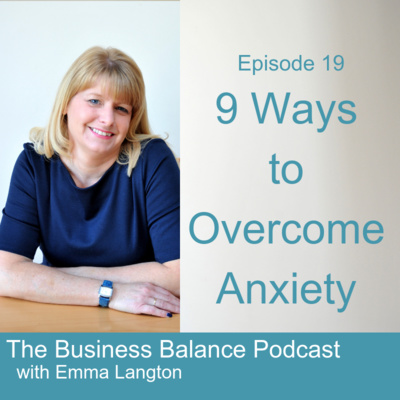
BBP19 9 Ways to Overcome Anxiety
The key to helping you overcome anxiety is recognising it’s there. Anxiety is worrying or a feeling of unease, fear or worry. All of us can have some form or level of anxiety in our lives, although usually in a mild way or for a short period of time or because of a particular event or circumstance in our lives.
There might be anxiety about everyday things. Listen when I explain what might cause anxiety and some anxieties that come up in my house.
Anxious symptoms can differ from person to person. Listen in where I list what some of these might be.
Sometimes we can trace things back to a specific time, place or situation when they began to feel frightened, worried or anxious. Those feelings can be repeated and re-played on a regular basis.
There may be life circumstances, like a busy job, work pressure or hectic home life that leave someone feeling anxious. What you might not realise is that your diet may impact the way you feel.
If you really want to overcome anxiety it’s often worth taking a bit of time to consider where it’s coming from or what might be causing it.
Although I do recognise that sometimes we have no idea.
What helps us overcome anxiety?
Breathing - Taking a deep breath down into your stomach releases feel-good chemicals, which in turn help to calm down the brain and body functions. It’s been scientifically proven to help calm us.
Stop the Catastrophe 16.10m
Our brain is wired to assess a situation and make quick decisions. This means we can often run away into doom and gloom and everything is a catastrophe. When that happens we need to bring this back.
Be Logical 17.35m
Once you’ve done the breathing and calmed down, you can be more logical and analyse the situation and look for another outcome than can happen.
Is there any other way I can look at this?
Is there any other reason I can have for this thinking?
How true is my thinking?
What other way can I begin to think about this scenario?
Instead of focussing on the catastrophe you begin to see possibility.
Control the emotions 19.45m
So we want to make sure that we are not getting into a situation where our emotions control our reasoning. Those emotions are a pain in backside when they kick off and stop us doing things we want to do.
Speak to someone 19.45m
So it’s also important to speak to other people. Often those thoughts go round and round in our heads and if we can just manage to speak to someone about what’s going on in our head, or tell someone how we are feeling then the anxiety calms right down.
It’s important to increase our feel good chemicals to balance out the good stuff with the anxious chemicals.
Exercise 22.25m
Exercise is also great for boosting those feel-good chemicals, rather than having those anxious thoughts and feelings. This doesn’t have to be at the gym. It might just be a walk in your lunch-break or a run round the park with your kids.
Music 23.40m
Music is a great way to increase the feel-good feelings. I know people who have created particular play-lists which are calming or upbeat.
Journalling 24.40m
Writing things enables you to connect with the thoughts and feelings.
It might also help you recognise patterns of anxiety or just offload thoughts each day.
Healthy Diet
Diet is so important. If you've been anxious all day then go for take-away or quick food it might be loaded with sugar and that's not good for anxiety. Try to plan ahead for any anxious or difficult days.
The more you work on anxiety the easier it is to stop it taking hold. It’s really OK that different things work for different people. Find out what helps you to stop your anxiety.
Find me at www.emmalangton.com or email from the contact page to get in touch. Get your free overwhelm emmalangton.activehosted.com/f/5
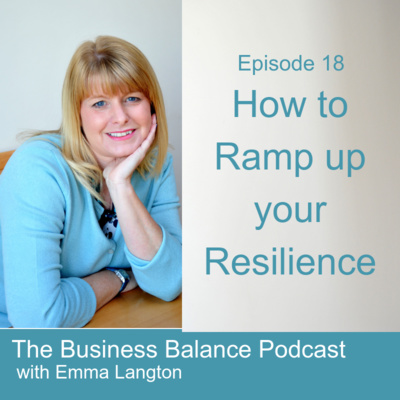
BBP18 Ramp up your Resilience
- Assess the situation
- Check out the emotions, thoughts and feelings and what to do with them.
- Look for different scenarios
- Make plans to be able to deal with challenge
- Take time out to rest or recover from the impact or clear space if needed
- Ask for support or just find a way to offload
- Look after your physical and mental health
With these ways we can continue to improve our resilience to deal with whatever life throws at us.
Contact me at www.emmalangton.com/contact/ if you have comments or questions about this or to book a discovery call to work with me.
Get your free guide 7 Steps from Overwhelm to In Control www.emmalangton.com/overwhelm/
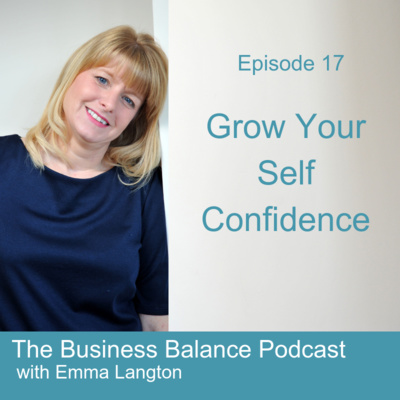
BBP17 Grow Your Self Confidence
Your self-confidence (or lack of it) isn’t written in stone. You can learn, increase, practice self-confidence such like any other skill. Once you increase your self-confidence your life will seem so much better and easier.
We look at What Confidence Is and the steps we need to take to increase our self confidence. Emma talks through steps of
- Recognise
- Get Started
- Practice
- Self Talk
- Support
- Reflect
- Success
There's a great story about how Emma supported her daughter with her confidence building and recognition that not everything can be scripted in life. We need to get comfortable having a go.
You can work with Emma on your confidence at: at www.emmalangton.com/workwithme
or get your free self doubt to self belief guide at bit.ly/SelfDoubtPodGuide
The key to maintaining great self-confidence is to have all these ways that we can use to bounce back.
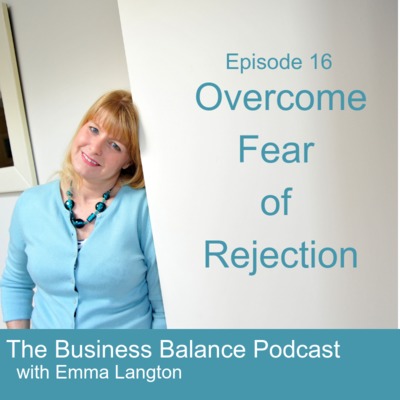
BBP16 Overcome Fear of Rejection
Book a call with Emma to discuss how this can help you at at bit.ly/30minsappt
Listen as Emma explains why we fear rejection and covers ways of overcoming it with
- Check out the root cause
- Learn tools to keep emotions under control
- It’s not personal
- Keep perspective.
- Improve your Resilience
She shares how she overcame the fear she had too.
Nowadays it’s very different way of surviving. So those no’s and rejections don’t have the power that our primitive brain think they have! Don’t let yourself get caught up in that fear of rejection. You can take action so that you no longer have to cope with the frustration of not getting where you want to be or not taking steps to get the outcomes you want.
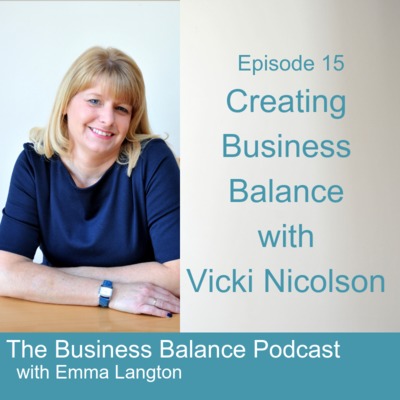
BBP15 Creating Business Balance with Vicki Nicolson
In middle of August Vicki had sent an email saying she was finally finding the balance in her business and the school holidays. Emma invited her onto the podcast to talk about how Vicki got that balance today in her Branding Business.
Vicki talks about starting the business 3 years ago and despite thinking it’s going to be great running a business we have to do all things in the business, with accounts, marketing, key word google searches and a whole lot more. She found herself overwhelmed even though she was doing something she loved.
We chat through the realisations, the self development, the support, outsourcing and what is the deal-breaker for Vicki.
Vicki shares why she does this and how it's important to remember this.
Finally, we talk about what managing time and boundaries look like for Vicki too
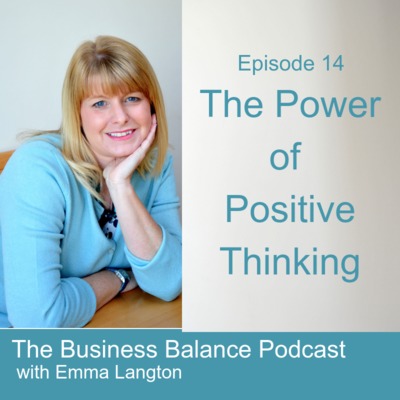
BBP14 Power of Positive Thinking
This isn’t just about telling ourselves things are “fine” or repeating phrases and affirmations like “today is a great day”.
When we start to think positively we are re-wiring our brain. We create new neural pathways so that eventually, thinking positive becomes automatic.
Listen as Emma dives into some tips on how to think positively and explains that negative thinking is a survival instinct.
- Notice positives every day. Take 5 minutes each morning, evening, on your journey home to think about your day.
- Keep a Perspective. It’s so easy to have the last hour of the day to difficult and then be telling yourself it was a rubbish day!
- Turn negatives around by changing the way you speak about difficulties.
- Surround yourself with positive people who support you.
Book a call to discuss working with Emma at bit.ly/30minsappt
or go to www.emmalangton.com
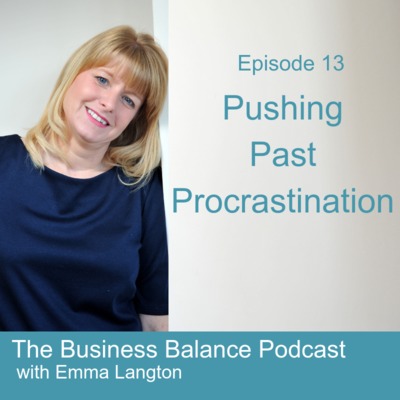
BBP13 Pushing Past Procrastination
This week Emma talks through ways you can push past your procrastination. Listen in as she talks through different options that can help you.
- work out the fear or emotion behind the procrastination
- dealing with overwhelm of getting started
- how to reframe waiting for perfect
- look at big picture thinking and remember why
- break things down into achievable chunks
- set better deadlines
- switch off from distractions
finally get support or accountability to get you through all this. And Emma is still taking calls to discuss working with her this Autumn. You can book here bit.ly/30minsappt
or see her website at www.emmalangton.com
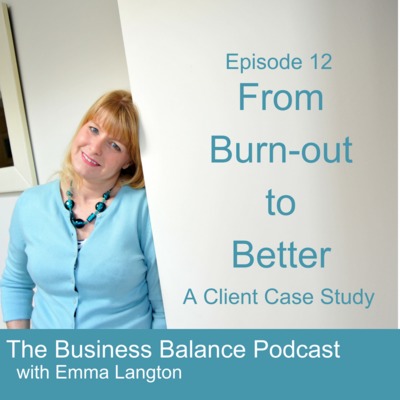
BBP12 From Burn-out to Better (a client case study)

BBP11 Why You Need A Breathing Technique
Effective deep breathing can reduce stress, anxiety and create space in our head by releasing calming chemicals.
There's a key important factor that you need to include which has been proven to switch off your fight flight response.
Practicing this frequently will mean it becomes automatic (just like your times tables) and it goes into the subconscious part of our brain. You can use it in a subtle, easy way and Emma gives suggestion when you can practice, easily, in your day.
If you don't like the example Emma gives, then check out others on the internet or on Emma's blog.
Get your free Self Doubt Guide bit.ly/SelfDoubtPodGuide
Find out how to work with me www.emmalangton.com/work-with-me/
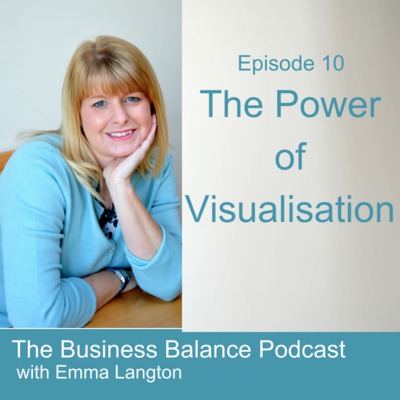
BBP10 The Power of Visualisation
We can create a vision of how we want to be and stop worries, self doubt or anxiety. Our brains are naturally wired to notice the negatives, so we need tools to help wire our brain for the positive and reach those goals.
Listen as Emma tells the story of a client who used this to great effect.
Our brain can't distinguish between real and imaginary so we can practice visualising exactly how we wish to be and this can embed into our subconscious brain.
Emma talks you thought the steps you can take and even if you don't think you see pictures, there's still things you can do.
- get really clear on goals
- create positive wording
- decide how you feel
- recognise body language
Include all these in the visualisation in the way Emma describes.
It increases self belief and that's really powerful. Get your free Self Belief guide bit.ly/SelfDoubtPodGuide
Want your personalised plan? www.emmalangton.com/work-with-me/

BBP9 Transforming Self Belief with Tina Leigh McDonald
Tina talks about her work with businesses and young people and Emma avoid getting on the soap box about the impact of today's schooling on self belief!
Tina also explain how she recently transformed her self belief after being nominated for the Rising Stars award and winning. The attendance at the awards ceremony really cemented that change in belief in herself.
You can find Tina at avalanchecoaching.co.uk/
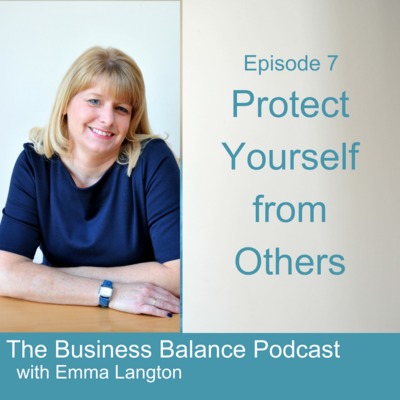
BBP8 Protecting Yourself from Toxic and Draining People
Listen as she talks about the different types of people who leave you drained. They might be negative, victims, moaning or "opera singers".
Emma shares how she got wise to working with some of these and what you can do about once you have the awareness which includes
- pick your battles
- stick to your boundaries
- stay away if necessary!
Then think about who can be radiator in your life. These people support, encourage, lift you up and restore your energies and why that is necessary. Emma also talks about how you can learn what drains your energy levels and what restores it.
The support of like-minded people is necessary to your success.
Contact Emma at www.emmalangton.com/work-with-me/

BBP7 Getting Balance in Holiday Times
This week Emma talks through a variety of mindset changes and strategy tips to help you enjoy time off.
Remember you are doing your best so be kind to yourself.
Look at where you're putting pressure on yourself and switch up the priorities. Sort the pressure and tasks into 3 lists with Absolutely, Be nice to do, Could do.
Then plan out the day or the week so that you and the kids know what to expect. We all benefit from routine.
Emma talks through how to change your mindset up about certain places or activities.
Notice where you can get a win for you and the kids.
Create opportunities for a cuppa and connection with your kids as this has huge benefits for all of you.
Learn about managing the day, the week with clear boundaries and expectations too.
For more info or to work with Emma www.emmalangton.com/work-with-me/

BBP6 Dealing with Overwhelm
She covers how to recognise when you're overwhelmed by noticing
- what's going on in your body
- what happens in your mind
- how it makes you feel.
That way you can identify your personal overwhelm signs and then how to deal with it.
She talks you through a few steps, the first is a trick that even though it seems rubbish is really effective - breathing!
Then Emma explains about taking a step back even when you don't feel you can.
Then break down the overwhelm and get it out of your head.
Make a plan about what to do with all those things
Ask for help where needed
Give yourself a break.
Get your free overwhelm emmalangton.activehosted.com/f/5
Don't forget to get your self doubt to self belief free guide bit.ly/SelfDoubtPodGuide
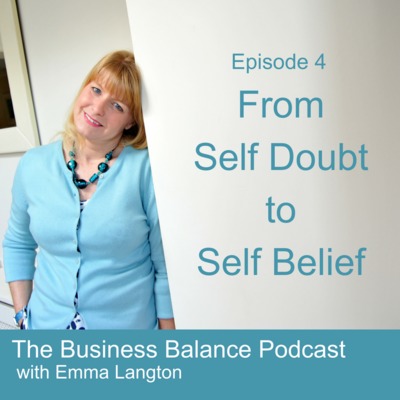
BBP5 From Self Doubt to Self Belief
Here Emma runs through 5 steps that you can do to shift those self doubts and build into more solid and positive beliefs. If you'd like a free guide to help you with these steps from Self Doubt to Self Belief then get it here bit.ly/SelfDoubtPodGuide
When you get thoughts about "what if this doesn't work" or other "what ifs" that are ultimately "what if I'm not good enough".
The 5 steps covered are:
1. Identify the doubts and own them
2. Challenge the doubts with key ways to do that
3. Change the way you think about doubts
4. Identify goals and steps to move forward
5. Recognise the progress and build new beliefs
If you'd like some personalised help or support to shift your self doubt then get in touch with Emma at www.emmalangton.com

BBP4 Creating Great Business Boundaries
Emma regularly hears from clients who
• feeling like they’re working all the time,
• needing to respond to people or emails quickly, or at ridiculous hours of day and night
• checking phone and emails All. The. Time.
• saying yes to things they don’t want to do
• feel like people are taking advantage
Listen to find out what you need to do to get yours in place which includes
Working on your mindset
Getting clear on your priorities
Confidently communicate your boundaries so you set expectation and create much less guilt, pressure and overwhelm.
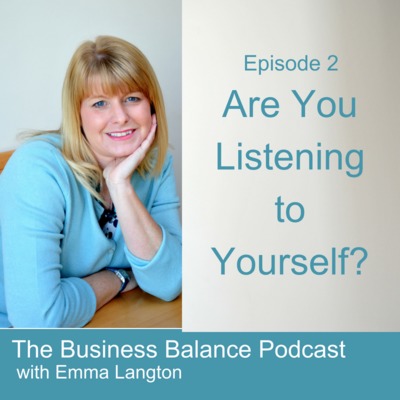
BBP3 Are You Listening to Your Negative Self Talk?
Did you know that the way we talk to ourselves can have a massive impact on the way we think, feel and view ourselves? So many times Emma hears people with negative self talk.
“I’m no good at …”
“I can’t do ….”
“I’m so silly”
“I’m fat”
“I don’t deserve ……”
In this episode Emma explains what happens when we are negative about ourselves and how we can change that.
Listen to Your Negative Self TalkMaybe you already know some of the things you say about yourself, or maybe you need to take a little time to actually listen to the words you use, the phrases you say and the way you talk to yourself and even about yourself. What do you hear? Negative phrases and comments can become embedded in your subconscious mind so that you repeat them without realising. Once you start listening to yourself you’ll be surprised at what you hear.
Be Your Own Best FriendIf you want to make improvements in your own self talk and improve the way you think and feel about yourself then you need to be your own best friend. Think about how you might guide and advise your best friend and then turn that phrasing, positivity and praise towards yourself. It might not be easy for you to hear – initially. It will get better and easier the more you do it.
Be KindBe kind to yourself and be kind to others around you too. Although we’re working on self talk, all talk is important. It’s much easier to have complete positive thoughts and language rather than kind words for yourself and forgetting to be positive and kind to others around you! If you see someone with great hair or gorgeous shoes, say so! If your child shows nice manners, say “hey nice manners”. You will feel good, but you know what? They will too and so it improves the attitude of everyone around you that you interact with. That in itself reduces the negativity.
Complement YourselfWe are rubbish at this. Particularly us with the good British stiff-upper -lip / don’t-show-our-feelings. When we don’t show our feelings to others, we don’t show them to ourselves. So, start to complement yourself. Do this regularly and see if you notice a difference in the way you feel about yourself.
Talking more positively to ourselves will have a great impact on the way we view ourselves. You start to embed more positive comments and phrases in your subconscious mind, so they become more automatic and then progress and positivity gets easier and easier. So go on, start today, change the way you talk to yourself. You deserve it!
You can get in touch with me, let me know how you get on with this or to book a call so we can talk about how to re-programme that negativity and get your feeling great about yourself.
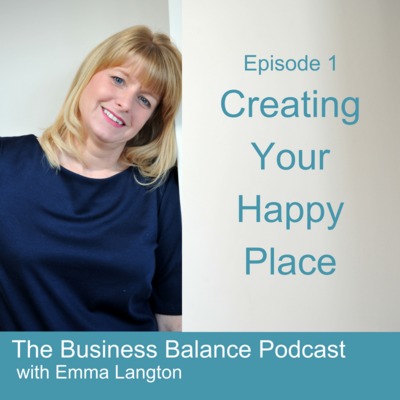
BBP2 Creating Your Happy Place
When things get too much in life, physically, mentally or emotionally it’s good to have somewhere to go to calm, recover, feel safe or to feel happy again. That’s why you need a Happy Place. Emma talks you through why you need a happy place and how to create your very own. It doesn't matter whether it's real or imaginary, when you've created yours you can take yourself there, in your mind, to rest, recover or just re-set our feelings and emotions.
Creating Your Happy PlaceThink of somewhere that makes you feel happy, calm safe (or some other positive feeling). This place can be real or imaginary! It doesn’t have to be in your house or nearby.
- Take 5 minutes or so to sit somewhere comfortable.
- Think of a place where you are completely relaxed, feeling happy or safe or calm
- Imagine it vividly – colours, sounds, textures, temperature, smells – everything.
- Notice how you feel in this place. Are you happy, calm or relaxed.
- Notice where, in your body, you feel these happy or calm feelings.
- Give this place a name or a title.
Regardless of where you are, whatever you are doing, practice thinking of or saying this name or title and notice those good feelings flowing around your mind and body.
How Do We Use our Happy Place?When we have a place like this, real or imaginary, we can take ourselves there to rest, recover or just re-set our feelings and emotions. Notice with all your senses what you see hear, touch, smell, taste and even the temperature. This can change the sensations in our mind and body from whatever is unpleasant or negative to being more positive and comfortable.
My place (because I love being warm) is in a sauna which is not readily accessible! However my mum’s place is in her sewing room, with her sewing machine. Making lovely quilts, bags, cushions is her favourite pastime.
So where could yours be? If you struggle to think of somewhere look through holiday brochures or magazines for inspiration. Maybe you saw something in a film or a book? You can even make one up from a collection of ideas to create the best place ever!
You can get in touch with me, let me know what your happy place is or to book a call so we can create one together.
